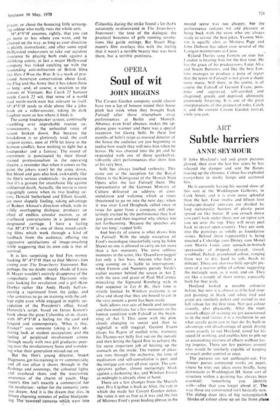OPERA
Soul of wit
JOHN HIGGINS
The Covent Garden company could almost have run a lap of honour round their home pitch last week when they brought back
Falstaff after those triumphant away performances at Berlin and Munich.
Absence, even brief absence, makes the ap- plause grow warmer and there was a special reception for Georg Solti. In these last months of Solti's reign as musical director of the house the audience are just beginning to realise how much they will miss him when he leaves. He was cheered into the pit and he responded with one of those quicksilver, vibrantly alert performances that show him at his very best.
Solti has always loathed verbosity. This came out at the reception for the Royal Opera in the Konigssaal of the Munich State
Opera after the last Falstaff there. The representative of the German Ministry of
Culture delivered an address of com- mendation and welcome which at times threatened to go on into the next day; when it was over Lord Drogheda called once or twice for quiet from a company still chat- teringly excited by the performance they had just given and then inquired why silence was not forthcoming. 'Because the speeches are far too long', rapped Solti.
And brevity of course is what draws him to Falstaff. With the single exception of
Ford's monologue (masterfully sung by John Shaw) no one is allowed to carry on for more than a few moments. The most sublime moments in the score, like 'Quand'ero paggio' last only a few bars. Anyone who feels a song coming on is liable to interruption: when Fenton and Nannetta parody Verdi's earlier manner behind the screen in Act 2, with the ease and grace of Paul McCartney
mimicking the Sigmund Romberg style in that sequence in Let It Be, their time is
strictly limited. In Windsor everyone is so alive and sharp that they are bound to cut in the very instant a point has been made.
Solti allows two acts of bustle and intrigue and then meditates for a few moments on tfie human condition with Falstaff at the begin- ning of Act 3. This scene with the pink clouds changing to sunset and then to nightfall is still magical. Geraint Evans clasps his flagon of mulled wine, warming his Thames-wet belly first out on the outside and then letting the liquid flow to achieve the far more important job of heating up the stomach on the inside. The tremor of pleas- ure runs through the orchestra, the time of meditation and self-consolation is past, and the intrigue can start all over again. The con- spirators gather, almost menacingly black against a darkening sky, and Windsor Forest at midnight is already close at hand.
There are a few changes from the Munich cast. Ilva Ligabue is back as Alice. the role in which she made her Covent Garden debut; the voice is not as free as it was and the line of Mistress Ford's great leading phrase in the second scene was too choppy, but the performance radiates wit and pleasure at being back with the team who are always ready to savour the best jokes. Yvonne Min- ton is equally alert as Mistress Page and John Dobson has taken over several of the Lanigan mannerisms as Canis.
Ryland Davies sang Fenton on tour but 1.ondon is hearing him for the first time. He has the grace of his predecessors. Luigi Alva and Stuart Burrows, and like the best Fen- tons manages to produce a pang of regret that the tenor in Falstaff is not given a shade more music. Still there, in the centre, is of course the Falstaff of Geraint Evans. pom- pous and aggrieved, self-satisfied and chagrined, greedy and deprived, ultimately generously forgiving. It is one of the great interpretations of this greatest of roles. Catch it, and the current Covent Garden revival, while you can.


































 Previous page
Previous page